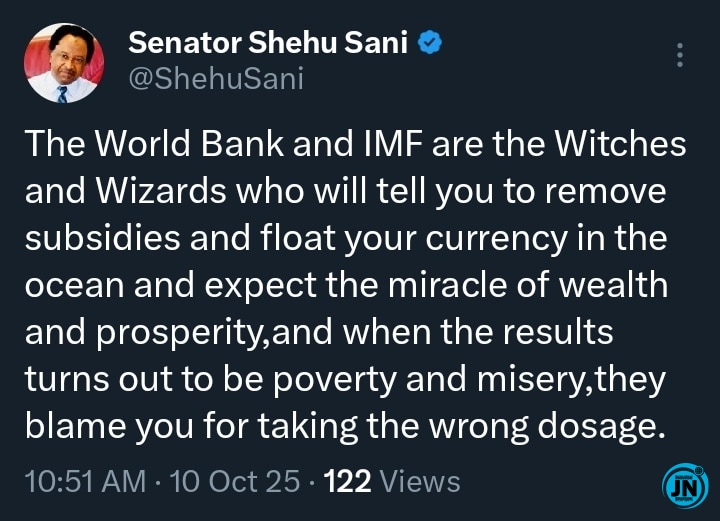Former Kaduna State Senator and All Progressives Congress (APC) chieftain, Shehu Sani, on Friday, issued a strongly worded reaction to the recent World Bank and International Monetary Fund (IMF) reports highlighting Nigeria’s deepening poverty crisis. His comments have since sparked wide discussions across social media and political circles.
Sani, known for his outspoken criticism of international financial institutions, accused the World Bank and IMF of deliberately pushing harmful economic policies disguised as reforms that continue to hurt developing nations like Nigeria. According to him, these institutions often promote policies that benefit foreign interests while leaving African economies in ruin.
What World Bank/IMF Report Says
The most recent findings from the World Bank’s Poverty & Equity Brief and other assessments reveal a troubling trend: Nigeria remains trapped in a cycle of widespread poverty and deepening inequality. Despite being Africa’s largest economy by GDP, millions of citizens continue to live below the poverty line, and progress in poverty reduction has stalled significantly.
The World Bank estimates that since 2018/2019, over 45 million Nigerians have fallen into poverty—an alarming increase that pushes the country’s projected poverty rate to nearly 47 percent in 2024. In rural communities, the situation is even worse, with about 75.5 percent of residents living below the national poverty threshold.

The poverty burden on children is especially severe. For Nigerians aged between 0 and 14 years, the report records a staggering 72.5 percent poverty rate, underscoring a generational crisis that threatens the country’s future human capital development. Factors such as poor access to education, gender inequality, and regional disparities continue to widen the economic gap between urban and rural populations.
The International Monetary Fund (IMF), in its own review, paints a similarly bleak picture. It revealed that between 2014 and 2023, Nigeria’s real per capita GDP declined on average by 0.7 percent annually. As of 2023, the poverty rate stood at approximately 42 percent, with inflation and unemployment worsening the living conditions of millions of Nigerians.
Both institutions warn that unless Nigeria addresses key structural challenges—including weak institutions, overreliance on oil, high inflation, and persistent inequality—the country could witness an even higher poverty rate in the years ahead. These reports have generated intense debate among policymakers, economists, and citizens about the direction of Nigeria’s economic reforms.
Shehu Sani’s Reaction
Reacting to the reports, Senator Shehu Sani took to social media to lambast the Bretton Woods institutions. In his words: “The World Bank and IMF are the Witches and Wizards who will tell you to remove subsidies and float your currency in the ocean, promising wealth and prosperity. But when the outcome turns out to be poverty and misery, they turn around and blame you for taking the wrong dosage.”
Sani’s statement reflects widespread frustration among Nigerians who have felt the negative impact of harsh fiscal and monetary reforms recommended by these institutions. He argued that policies such as fuel subsidy removal, currency devaluation, and trade liberalization—often imposed under IMF or World Bank advice—have worsened the cost of living, crippled local industries, and increased unemployment.
The former senator further accused the IMF and World Bank of acting as modern-day “economic colonizers,” imposing a one-size-fits-all model that ignores Nigeria’s unique socio-economic realities. According to him, these so-called reforms are designed to trap African nations in cycles of dependency and debt while draining their natural and human resources.

He urged the Nigerian government to develop homegrown economic strategies rooted in the country’s specific conditions rather than relying on foreign institutions whose recommendations have historically failed to deliver positive outcomes. “No nation has ever prospered by outsourcing its destiny to foreign advisers,” Sani wrote, emphasizing the need for policies that empower local industries, protect jobs, and uplift the poor.
His comments have since drawn mixed reactions, with many Nigerians agreeing that the IMF and World Bank’s policy advice often benefits foreign creditors at the expense of the local population. Others, however, argue that Nigeria’s leaders bear the greater responsibility for poor implementation and corruption that prevent reforms from achieving their intended goals.
Regardless, Sani’s fiery remarks have reignited a long-standing debate on whether international financial institutions truly have the interests of developing nations at heart—or whether they are, as he described, “the witches and wizards” of global economics.